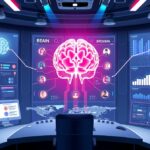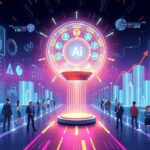
Embrace the Future: AI-Integrated Marketing Automation for Growth
September 18, 2025
Get the Competitive Edge: AI-Powered Lead Generation for Sales Success
September 18, 2025In today’s highly competitive business landscape, the process of Lead Generation has evolved from being a mere marketing strategy to a crucial element that determines the success and growth of businesses. Lead Generation identifies and attracts potential customers (leads) for your products or services. It acts as the first step in the sales funnel and is instrumental in converting prospects into loyal customers. While traditional lead generation methods were often manual, time-consuming, and less efficient, the advent of Artificial Intelligence (AI) has revolutionized this aspect of business operations.
What is Lead Generation?
Lead generation is the lifeblood of any successful business. It involves identifying and attracting potential customers, nurturing them through various marketing efforts, and ultimately converting them into paying customers. The process starts with capturing the interest of potential leads through multiple channels such as social media, content marketing, email campaigns, and more. Once charged, these leads need to be qualified and scored to prioritize follow-up efforts. AI has transformed this process by automating lead scoring and enabling businesses to focus on high-potential tips, thus optimizing sales efforts and resources.
The Impact of AI on Lead Generation
AI has emerged as a game-changer in the field of lead generation. Its ability to process vast amounts of data, learn from patterns, and make data-driven predictions has elevated lead generation to a new level. By harnessing AI’s capabilities, businesses can gather insights from customer data to understand their behavior, preferences, and pain points. This information allows them to create hyper-personalized marketing strategies that resonate with individual leads, leading to higher conversion rates. Moreover, AI automates repetitive tasks, freeing human resources to focus on more strategic and creative aspects of lead generation.

Understanding AI-Driven Lead Generation
How AI Automates Lead Scoring
Lead scoring is a critical aspect of lead generation as it helps prioritize leads based on their likelihood of converting into customers. Traditionally, lead scoring was manual and time-consuming, relying on subjective judgments. AI-driven lead scoring has revolutionized this process by using machine learning algorithms to analyze historical data and identify patterns that indicate a lead’s potential to convert. AI can consider multiple data points simultaneously, including customer behavior, demographics, past interactions, and more, enabling businesses to make more informed decisions about which leads to prioritize. This saves time and ensures that the sales team focuses on high-value leads, improving overall conversion rates and maximizing return on investment (ROI).
Personalization and AI in Lead Generation
Personalization has become a buzzword in the marketing world and for a good reason. Customers today expect personalized experiences and relevant content catering to their needs and interests. AI plays a crucial role in achieving this level of personalization at scale. By analyzing vast customer data, AI algorithms can identify individual preferences, browsing behavior, purchase history, and more. Armed with these insights, businesses can tailor marketing messages, offers, and recommendations to resonate with each lead on a personal level. For example, AI can create personalized product recommendations based on a lead’s browsing history or send customized email campaigns that address specific pain points. This level of personalization increases the chances of conversion and enhances customer satisfaction and loyalty.
Leveraging AI for Predictive Analytics
Predictive analytics is one of the most powerful applications of AI in lead generation. Predictive analytics involves using historical data and AI algorithms to predict future outcomes. In the context of lead generation, predictive analytics can help businesses identify which leads are most likely to convert into customers. By analyzing past customer behavior, demographics, and interactions, AI can uncover patterns and trends indicating a lead’s likelihood of purchasing. This allows businesses to focus their resources on information with the highest conversion potential, increasing the efficiency and effectiveness of their lead-generation efforts. Predictive analytics also enables businesses to forecast sales and revenue, helping them make more informed business decisions and allocate resources strategically.
The Role of Natural Language Processing (NLP)
Natural Language Processing (NLP) is a subfield of AI that focuses on enabling computers to understand and interpret human language. In the context of lead generation, NLP plays a crucial role in improving customer engagement and support. Powered by NLP algorithms, Chatbots can interact with leads in real time, answer their queries, and provide relevant information. NLP allows chatbots to understand the context and intent behind a lead’s questions and respond human-likely, creating a seamless and personalized customer experience. NLP also enables businesses to analyze customer feedback, reviews, and social media comments to gain valuable insights into customer sentiment and preferences. By understanding the language of their customers, businesses can tailor their marketing messages and content to better connect with their audience.

Implementing AI-Driven Lead Generation Strategies
Integrating AI into Your CRM
Customer Relationship Management (CRM) systems are the backbone of lead generation and sales processes. Integrating AI into your CRM can enhance its capabilities and provide valuable insights to your sales and marketing teams. AI-powered CRMs can automate data entry, lead scoring, and lead nurturing, streamlining the lead management process. They can also provide real-time insights and predictions, allowing businesses to proactively identify sales opportunities and potential challenges. With AI assisting in customer segmentation and personalized communication, businesses can create targeted marketing campaigns that resonate with individual leads, increasing the likelihood of conversion.
AI-Enhanced Content Marketing
Content marketing is an essential strategy in lead generation, but producing high-quality content consistently can be challenging. AI can assist in various aspects of content marketing, from generating topic ideas to optimizing content for search engines. AI-powered content generation tools can analyze existing content, identify gaps, and suggest new topics likely to resonate with your target audience. These tools can also help optimize content by analyzing keywords, readability, and engagement metrics. Additionally, AI can be used to personalize content for different segments of your target audience. For example, by analyzing user behavior and preferences, AI can create customized product and content recommendations that align with each lead’s interests.
Chatbots and Conversational AI
Chatbots have become an increasingly popular solution for lead generation and customer support. AI-driven chatbots can interact with leads in real time, answer their questions, and provide assistance. This instant and personalized support improves the customer experience and helps qualify leads more effectively. Chatbots can engage with leads anytime, ensuring they receive timely responses to their inquiries, which can significantly impact the conversion rate. Moreover, chatbots can be integrated into various platforms, including websites, social media, and messaging apps, providing multiple touchpoints for lead engagement. They can also collect valuable data from customer interactions, helping businesses better understand customer preferences and pain points.
AI-Powered Email Marketing Campaigns
Email marketing remains a potent tool in lead generation, but the effectiveness of email campaigns often depends on personalization and relevance. AI can enhance email marketing by providing insights into customer behavior and preferences. AI algorithms can analyze historical data to identify the best times to send emails and the most relevant content for each lead. By creating personalized and targeted email campaigns, businesses can significantly increase email open and click-through rates, leading to more qualified leads and conversions. AI can also automate A/B testing, allowing businesses to experiment with different subject lines, content, and layouts to determine what resonates best with their audience.

Overcoming Challenges and Concerns
Data Privacy and Security
As AI-driven lead generation relies heavily on customer data, businesses must prioritize data privacy and security. Collecting and processing large amounts of customer data comes with a responsibility to protect that data from unauthorized access, breaches, and misuse. Ensuring compliance with data protection regulations such as GDPR is crucial to maintain customer trust and avoid potential legal consequences. To safeguard customer information, businesses must implement robust data security measures, such as encryption, access controls, and regular audits. Additionally, transparent communication with customers about data collection and usage practices can help build trust and demonstrate a commitment to data privacy.
Balancing Automation and Personalization
While automation is a significant advantage of AI-driven lead generation, businesses must balance automation and personalization. Over-automation can lead to impersonal interactions and diminish the customer experience. To avoid this, businesses should use AI to complement and enhance human interactions rather than replace them entirely. For example, while chatbots can handle routine inquiries and quick responses, complex queries or issues may require human intervention. By combining automation with a human touch, businesses can deliver a more seamless and satisfying customer experience.
Addressing Ethical Considerations
Integrating AI in lead generation raises ethical considerations, especially concerning data usage and decision-making. Businesses must ensure that AI algorithms are designed and trained without inherent biases that may unfairly impact specific groups of customers. Transparency and clear communication with customers about using AI in lead generation is essential. Customers should be informed about the presence of AI-driven tools, how their data is being used, and what decisions are being made based on AI insights. This level of transparency fosters trust and helps customers feel more comfortable engaging with businesses that employ AI.
AI Adoption and Employee Training
Implementing AI-driven lead generation strategies requires employee training to use AI tools and effectively extract insights from the data. AI is only as effective as those operating it and interpreting its outputs. Businesses must invest in upskilling their workforce to leverage AI’s full potential and adapt to the changing landscape. Training should focus on the technical aspects of using AI tools, understanding the underlying data, and using AI insights to make informed decisions. By empowering employees with AI knowledge and skills, businesses can drive successful AI adoption and create a culture that embraces innovation.

Real-Life Success Stories
Zapier: Boosting Conversion Rates with AI-Driven Lead Generation
Zapier is a leading automation platform connecting various web applications, allowing users to create automated workflows without coding knowledge. The company faced a common challenge in digital marketing: how to convert website visitors into customers efficiently. To address this, Zapier implemented AI-driven lead scoring to identify high-potential leads based on their interaction with the platform, user behavior, and preferences.
Zapier could analyze vast user interaction data through AI-powered lead scoring and identify patterns indicating a lead’s likelihood of converting. The AI algorithms considered various factors, such as the frequency of platform usage, specific actions taken by users, and their engagement levels. By prioritizing its sales efforts on these high-value leads, Zapier was able to focus its resources more effectively and increase conversion rates by an impressive 25% within just six months.
Salesforce: Scaling Operations with AI-Powered CRM
Salesforce is a renowned global customer relationship management (CRM) software leader. As the company’s customer base grew rapidly, it faced challenges in efficiently managing and nurturing leads. Salesforce integrated AI into their CRM system to address this scalability issue, revolutionizing their lead generation efforts.
With AI-driven automation, Salesforce’s CRM could handle lead nurturing and follow-up processes with enhanced efficiency and personalization. The AI algorithms analyzed customer interactions, identified upselling opportunities, and recommended the most suitable products for each lead. This saved time and resources for the sales team and resulted in a significant expansion of their customer base by 40%. The AI-powered CRM allowed Salesforce to improve customer retention by delivering more personalized experiences tailored to each lead’s preferences and needs.
Spotify: Delivering Exceptional Customer Experience with Chatbots
Spotify, the world’s leading music streaming service, faced a challenge in providing instant support and delivering exceptional customer experiences to its rapidly growing user base. Spotify deployed AI-driven chatbots on their website and social media platforms to tackle this issue.
The chatbots were powered by advanced Natural Language Processing (NLP) algorithms, allowing them to understand customer inquiries and respond in a conversational and human-like manner. This instant and personalized support significantly reduced response time by an impressive 70%, leading to a substantial increase in customer satisfaction.
The AI-driven chatbots allowed Spotify to engage with their users 24/7, addressing their queries and providing assistance whenever needed. By collecting valuable data from customer interactions, Spotify gained insights into customer preferences and pain points, further improving its service offerings and content recommendations. The success of their chatbot implementation showcased how AI-driven customer support can have a profound impact on lead conversion and customer loyalty.
Amazon: Optimizing Email Campaigns with AI Insights
Amazon, the world’s largest online retailer, has a massive customer base and conducts extensive email marketing campaigns. However, they wanted to optimize their email marketing efforts to enhance engagement and increase conversions. Amazon turned to AI analytics to analyze customer behavior and preferences to achieve this.
The AI algorithms analyzed vast customer data, including past purchases, browsing behavior, and interactions with email campaigns. This analysis allowed Amazon to personalize their email content and timing for each customer. The AI-driven insights helped Amazon identify the best times to send emails to each individual, ensuring they reached customers when they were most likely to engage with them.
By implementing these AI-powered optimizations, Amazon experienced a remarkable 35% increase in email open rates and a 20% increase in click-through rates. This resulted in a substantial 50% boost in qualified leads generated from email campaigns. The success of Amazon’s AI-driven email marketing demonstrates how AI can significantly impact lead generation by delivering relevant and timely content to potential customers.

The Future of AI in Lead Generation
Advancements in AI Technology
The field of AI is continuously evolving, and advancements in technology will undoubtedly significantly impact lead generation in the future. AI algorithms will become even more sophisticated, enabling businesses to gain deeper insights from customer data and make more accurate predictions about customer behavior. Natural Language Processing (NLP) will also continue to improve, allowing chatbots and virtual assistants to interact with customers more naturally and human-likely.
AI-Driven Market Research and Lead Identification
AI will play a pivotal role in market research, helping businesses identify potential leads and opportunities in their target markets. By analyzing vast amounts of data from various sources, AI can identify trends and patterns that human analysts may have overlooked. AI-driven lead identification will become more precise and efficient, allowing businesses to target their marketing efforts effectively.
Hyper-Personalization and AI
The future of lead generation will be hyper-personalized, with AI at the forefront of this trend. AI will enable businesses to create highly personalized marketing campaigns, offers, and recommendations based on individual preferences and behaviors. Customers will receive marketing messages tailored to their needs and interests, increasing engagement and conversion rates.
AI and Augmented Reality in Lead Generation
As technology advances, augmented reality (AR) will become an increasingly valuable tool in lead generation. AI can play a significant role in integrating AR into marketing strategies. For instance, AI algorithms can analyze customer data to create personalized AR experiences, allowing potential customers to interact with products virtually before purchasing. This level of engagement can significantly influence buying behavior and lead to higher conversion rates.
The rise of AI-driven lead generation presents businesses with unprecedented opportunities to revolutionize their marketing strategies and achieve explosive growth. AI’s ability to automate lead scoring, personalize marketing efforts, and provide valuable insights from customer data has transformed how businesses attract and nurture leads. By leveraging AI-powered tools and technologies, businesses can optimize their lead generation efforts, improve conversion rates, and ultimately boost their bottom line. Embracing the AI revolution in lead generation is no longer an option but a necessity for companies looking to stay competitive and thrive in today’s dynamic business landscape.


